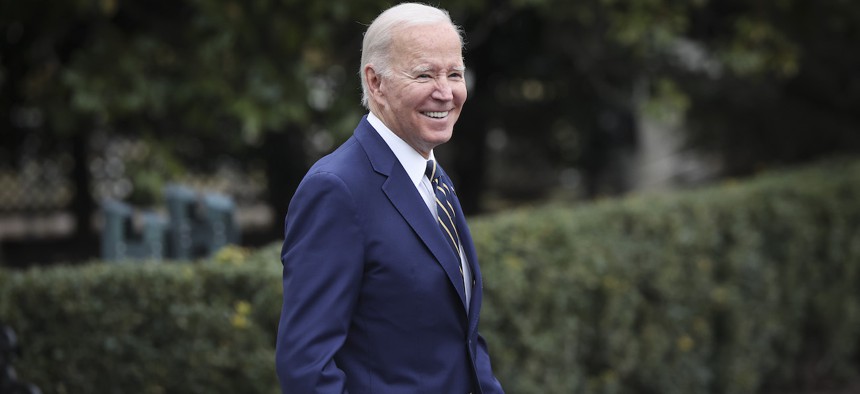
President Biden leaves the White House on Jan. 19, 2023 to travel to California to view damage caused by recent storms. Win McNamee/Getty Images
Coronavirus Roundup: Two Years of the Biden Administration
There's a lot to keep track of. Here’s this week's list of news updates and stories you may have missed.
Friday marks two years since President Biden was inaugurated and a new phase of the pandemic response began.
Brian Deese, director of the National Economic Council, put out a statement on Friday morning celebrating the economic agenda under the Biden administration to recover from the pandemic. “To safely put Americans back to work, we had to rapidly develop and deploy vaccines, increase testing access, and reopen our schools and businesses,” said Deese. “Two years later, COVID deaths are down over 80%. Vaccines, treatments like Paxlovid, and testing are ubiquitously available; and our schools and businesses are open again. We are far better positioned to deal with surges and new variants than before.”
In a “by the numbers” piece on Biden’s first two years, the Associated Press said the story is “a mixed bag.” In terms of COVID-19, 666 million vaccines, which weren’t approved until late in the Trump administration, were administered; 15.9% of Americans ages five and older have gotten the updated, bivalent shot; and 680,000 people have died from the coronavirus during Biden’s term. Here are some of the other recent headlines you might have missed.
On Tuesday the Biden administration released its first-ever National Strategy to Advance Equity, Justice, and Opportunity for Asian American, Native Hawaiian, and Pacific Islander Communities, which builds on previous work from the administration, such as to combat anti-Asian violence that increased dramatically during the pandemic. The strategy includes individual plans from 32 agencies.
The lack of permanent leadership at the National Institute of Health and its sub-agency National Institute of Allergy and Infectious Diseases could create issues now in a new era of divided government, Roll Call reported on Thursday. The president has yet to nominate a permanent replacement for NIH director of the National Institute of Health, more than a year after Dr. Francis Collins stepped down and Dr. Anthony Fauci’s departure in December. The former is a Senate confirmed position, but the other is not.
“Lawrence Tabak has served as acting NIH director since Collins departed, while Fauci’s deputy, Hugh Auchincloss — the father of Rep. Jake Auchincloss, D-Mass. — stepped in after Fauci retired,” said the report. “Both scientists have years of experience at the NIH, but Congress watchers and industry stakeholders say a permanent NIH head could smooth agency relations with Congress.” House Republicans, now in the majority, plan to take on a slew of investigations related to the federal government’s response to the pandemic and COVID-19 origins.
The Health and Human Services Department could improve its oversight of research involving potential pandemic pathogens, which is often referred to as “gain of function” research and has come under intense strain during the pandemic, the Government Accountability Office said in a new report. “In 2017, HHS developed an oversight policy that requires funding agencies to refer proposed research that is ‘reasonably anticipated to create, transfer, or use enhanced potential pandemic pathogens’ to the department for an additional review of associated risks and benefits, among other things,” said the report. “However, until HHS works with its funding agencies to develop and document a standard for ‘reasonably anticipated,’ the framework allows for subjective and potentially inconsistent interpretations of the criteria for referral, potentially leaving HHS without the assurance that funding agencies are referring all the research proposals that should be referred for departmental review.” HHS also “faces oversight gaps beyond the framework.” In its response, HHS neither agreed nor disagreed with two of GAO’s recommendations and agreed with the third.
This report “may fuel” Republicans investigations into this type of research that they’ve already expressed disturbance over, as Politico reported.
Federal Reserve Board Chair Jerome Powell tested positive for COVID-19 on Wednesday and was experiencing mild symptoms. “Chair Powell is up to date with COVID-19 vaccines and boosters,” said a statement from the Federal Reserve. “Following Centers for Disease Control and Prevention guidance, he is working remotely while isolating at home.”
On Wednesday, a federal appeals court affirmed a 36 -month prison sentence for a man who pleaded defrauding a COVID relief program to obtain $85,000, which he used to buy a Pokémon card. “[Vinath] Oudomsine contends that his sentence is substantively unreasonable because the court gave undue weight to the need for deterrence factor without providing a compelling deterrence rationale,” said the ruling. “He claims the real reason the court varied upward was that it did not like him, and the reason it didn’t was that of the $85,000 he obtained by fraud he spent $57,789 to buy a single Pokémon card. We are not persuaded.”
Help us understand the situation better. Are you a federal employee, contractor or military member with information, concerns, etc. about how your agency is handling the coronavirus? Email us at newstips@govexec.com.







